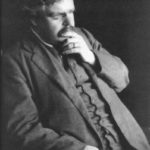Of Hobbits and Heroes
Reminder: two days remaining to vote for the 2010 Clive Staples Award – Readers’ Choice. Be sure to read the voting instructions carefully.
– – –
In literature as in life, heroism does not necessarily demand a Great Thing, such as Superman turning back the world to prevent widespread calamity. More often it seems that a hero becomes a true hero when he intervenes on the everyday level.
Readers became attached to Bilbo Baggins long before he entered the dragon’s lair. They cared about him as much for his hesitancy to go on a journey, for his love of second breakfast, a good pipe, and a comfortable spot in front of his own hearth as for his quick wit and commitment to his fellow travelers.
So here’s what I’m thinking. Heroes who are ordinary, at least on the outside, might be the most engaging. Would Superman be someone we would love if he didn’t present to the rest of the world as Clark Kent?
Let me turn a corner and extrapolate from some thoughts posted by blogger Khanya in Hobbits, Heroes, and Jesus – TGIF . First she brought up somehing G.K. Chesterton said:
fairy stories are not about extraordinary people, they are about extraordinary things happening to ordinary people.
This coincides with the concept she refers to earlier, that “most myths have a big story and a little story.”
The Lord of the Rings’ big story is Frodo saving Middle Earth by destroying (with Gollum’s help) The Ring. The little story within the big story is Sam choosing to go with Frodo instead of staying with the others in the fellowship. Or the little story is Frodo offering grace to Gollum—saving grace, as it turns out. The little story is Merry and Pippin escaping captivity and stirring up the Ents.
But the little stories and the big are so much more heroic because Hobbits performed the deeds. Hobbits, who might define ordinary. These were not folk who loved adventure, but they took it on because they were needed.
And isn’t that one thing, at least, that makes readers connect with a story or love a character? An ordinary person doing an everyday heroic act on the way to saving the world. Sounds like a book I’d like to read. 😉
Originally posted, though in a less edited form, at A Christian Worldview of Fiction, December 12, 2008.









































Thus why Sir Arthur Canon Doyle wrote from the perspective of Dr. Watson, rather than Holmes: we can relate to Watson’s ordinariness and “normal” view of things (even if they’re a Victorian normal), and so better appreciate the story as Holmes saves the day. We don’t always have to “like” the characters in a novel in the sense that we’d want to be best friends with them or have them over for dinner (some of my favorite characters would make nightmarish room mates), but we do have to care about them and appreciate their struggles, or the story is meaningless. Tension is created because we are afraid the hero might lose or the villain might succeed (or even vice versa): tension is defused when we simply don’t care who survives, when we care so little and are so removed from the plot that in the end, it just doesn’t matter what happens. That’s when you get into situation Shakespeare wrote about in Macbeth, of “a tale
Told by an idiot, full of sound and fury, Signifying nothing.”
I’ve heard it argued that Tolkien’s time in the trenches during WWI significantly shaped his concept of heroism. He witnessed many heroic acts by enlisted men who had no great love of war or adventure. They just wanted themselves and their mates to go home alive. Often, battles are won and lost based on the seemingly “minor” acts of the seemingly “unimportant” people.
Michelle, great observations about Holmes and Watson. I’d not put those stories in this light before, but I think your point is valid.
Jeff, I don’t see how an experience like war could help but affect a writer’s work. I can see how Tolkien’s ideas of heroism would be shaped by the experience, then worked out in his books.
Thanks for the input from you both.
Becky
I think the little story in Lord of the Rings was how small people can make a big impact on the world (and I’m not talking size of people). :o)